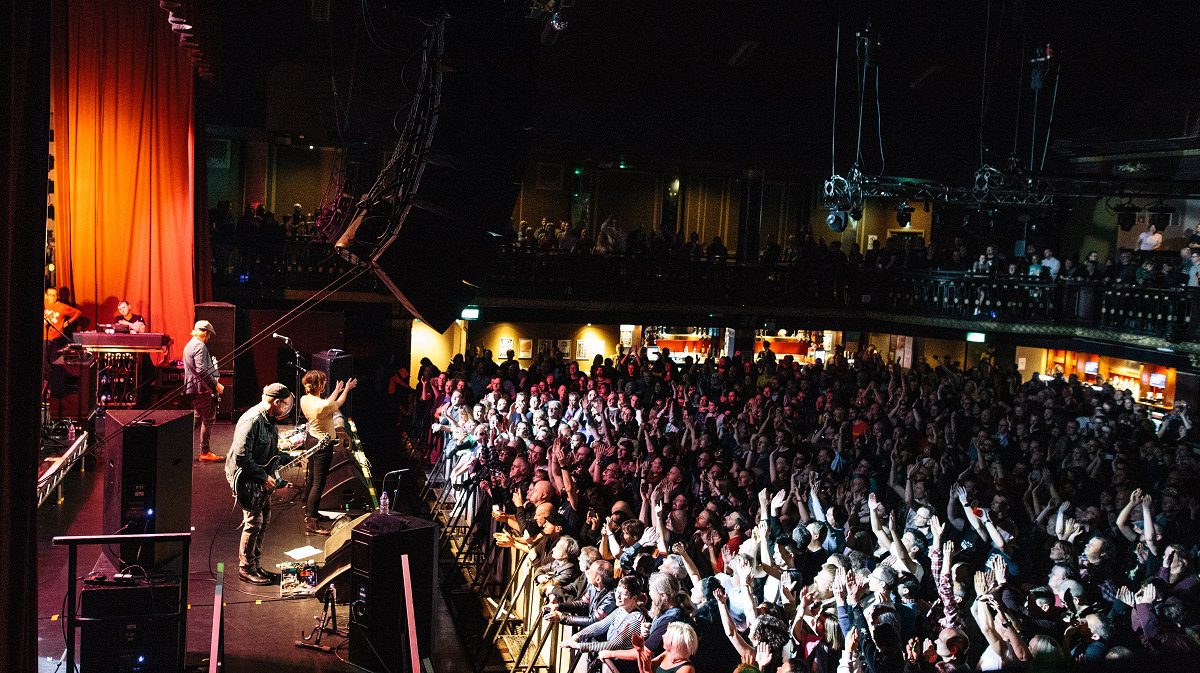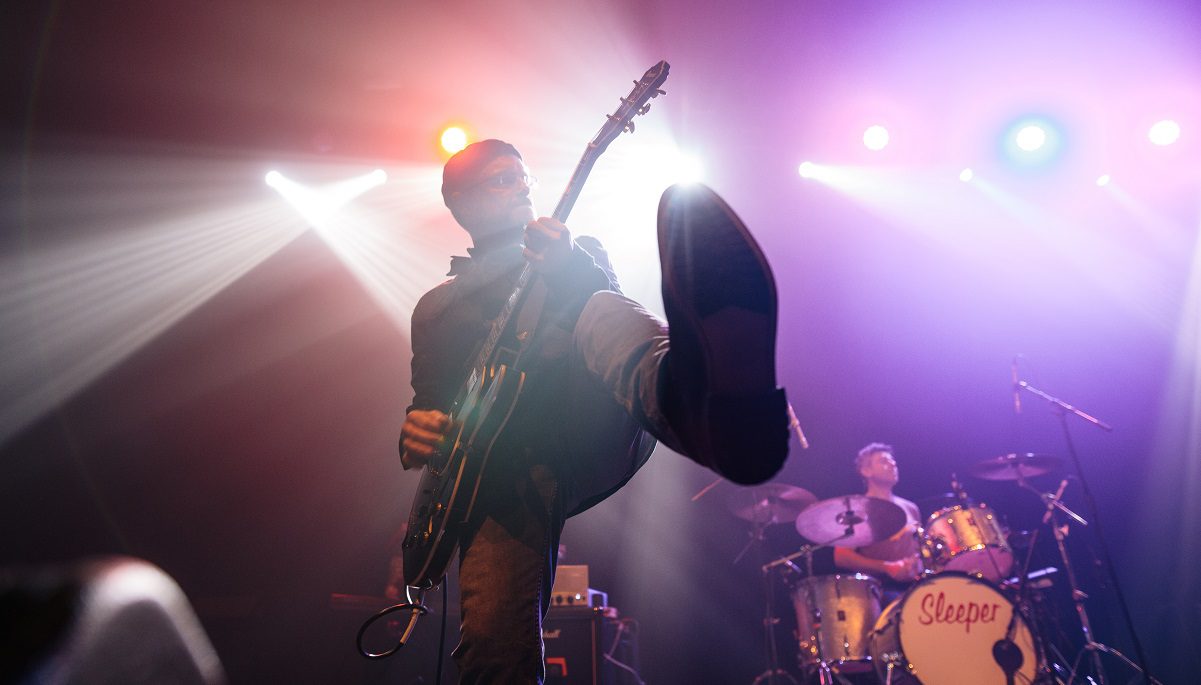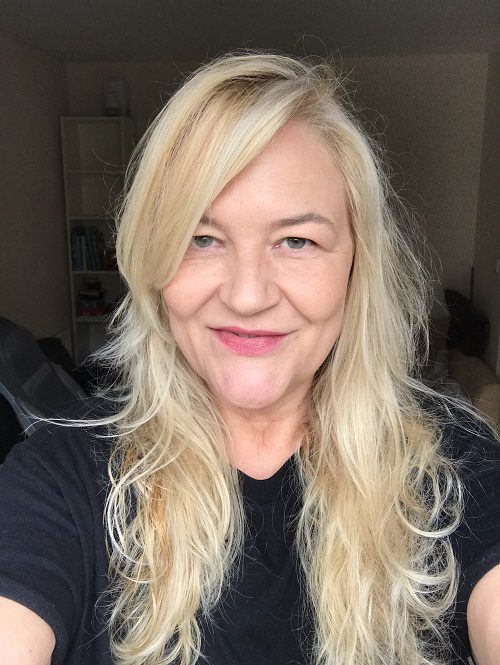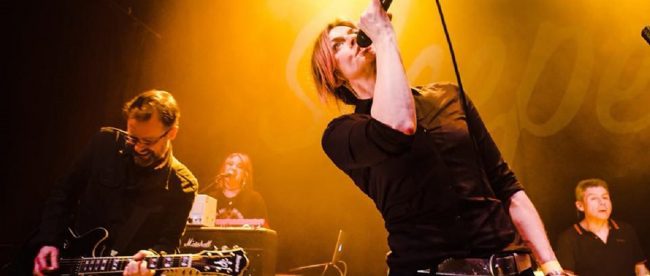Sleeper’s Jon Stewart on the Britpop 90s, fame, and reforming
Sleeper are an English rock band, part of the much-lauded Britpop movement in the 1990s. Up until 2017, that would have been ‘were’ – but the band, after a ‘life’s too short’ moment, reformed and now play sell-out gigs again. It’s enviable to make it big once, but twice?
During their early years in the ‘90s, they notched up eight Top 40 singles and three Top 10 albums in the UK, and also contributed to the soundtrack for the film Trainspotting. Having said they’d never reform, they’ve had a change of heart and have found that as well as their original fans – most of whom are now in their fifties and older – they’re enjoying reaching a whole new audience.
I met Dr Jon Stewart, lead guitarist and one of the band’s founders.

Jon Stewart
THE EARLY YEARS
“I met Louise Wener in a philosophy class at University of Manchester. We formed a band and moved to London after graduation. There weren’t many female-fronted groups in indie and pop music in the early 1990s, other than The Primitives (who’d had a fantastic international hit with Crash). Really you had to go back to bands like Blondie from the 1980s.
“We were signed by a small label called Indolent, which was part of major label RCA, and were in the first wave of Britpop bands to start having hits with our single Inbetweener and the gold-selling album SMART in 1995. This was followed by the platinum album The It Girl in 1996 alongside lots of media exposure, slots at all the main music festivals of the day, UK and world tours, etc.
“The 1990s was an amazing time for music. There were some fantastic artists and bands from the UK and USA that I’m sure we’re all familiar with; but there were also some really interesting and creative artists from the Europe, Japan and the developing world. It was a real privilege to be part of that as a musician.
“…we got to share stages with The Pixies, REM, Radiohead, Stevie Wonder, Prince… getting to meet and talk to other artists of that calibre was an incredible experience”
“Being in a band people knew about meant that you would sometimes be on a festival bill or on the same TV show with your own musical heroes. That’s how we got to share stages with The Pixies, REM, Radiohead, Stevie Wonder, Prince… getting to meet and talk to other artists of that calibre was an incredible experience.
“I also got to work in some famous recording studios with pretty legendary producers – particularly Stephen Street, who made all my favourite albums by The Smiths, Cranberries, Blur and more. So it was like a dream, really.
“Louise wrote all about it in her memoir ‘Just For One Day’ (Bloomsbury) which I think is the best autobiography from anyone who was in music during the 1990s. It’s laugh-out-loud and genuinely moving. Her writing style is extremely fluid and concise. I was delighted when she wrote the memoir, as it was like having your mate write up the history of your adventures together, plus the whole thing is true. I can testify to that.”
WHY DID IT END?
“Our first two albums went UK Top 5, which was a great achievement, but our third (Pleased to Meet You) was released after Britpop had peaked. It still went UK Top 10, and if you’d told me when we first signed a record deal that our third album would have been a hit like that, I would have been amazed, but at that time we’d moved over to the major record label and they expect high profile bands to hit Number 1. If that doesn’t happen, other artists on the label are prioritised instead… and you’re done for.
“If you’re tied into a movement it’s almost impossible not to go down with the ship as fashions change later on.”
“Life in a band is usually quite short-lived at that level. There’s so much to go wrong, and it is difficult to sustain the intensity. So planning ahead for when things change and your career moves on is very important for all artists.
“Preparing for it all to blow over is particularly relevant if you are associated with a movement, as we were with Britpop. Scenes always fade. If you’re tied into one it can be a useful way to gain attention for unknown bands, but it’s almost impossible not to go down with the ship as fashions change later on.”
MOVING ON
“I moved to Los Angeles and played some sessions for Canadian singer K D Lang and for former Spice Girl Mel C on one of her solo albums. I’m very proud of that as it was great to work with other artists and see how they put their ideas together. K D Lang, in particular, was a magical experience. She has the purest voice of anyone I’ve ever heard. Sitting together in a recording studio trading ideas back and forth, I played phrases on the guitar as she sang her new songs to me, was one of my top career “bucket list” moments.
“Then I came back to the UK and joined BIMM Institute when the first location opened as the Brighton Institute of Modern Music in 2002. The organisation has grown considerably since then. We now have music colleges in five UK cities and three EU cities. We’ve become Europe’s market leading provider of popular music and creative arts education.
“BIMM Brighton alumni include James Bay, The Kooks, Tom Odell (each of whom I taught) and hundreds of our graduates now work at all levels in every sector of the music business, and across all the wider areas of the culture industry. I’ve also become a very active and widely published academic researcher and gained my PhD from the University of Southampton. My first book is coming out on Cambridge University Press in 2021.”
AND NOW YOU’RE BACK?
“We’d always said we would never reunite. We’re all too busy for one thing. Then Louise had a change of heart when someone close to her got seriously unwell. It was our twentieth anniversary year and I think she realised that life is just too short.
“…when the Starshaped Britpop festival organisers got in touch in 2017 it turned out to be the right people at the right time.”
“So, when the Starshaped Britpop festival organisers got in touch in 2017 it turned out to be the right people at the right time. They put together a run of shows at larger venues with Dodgy, Space, Bluetones and Salad. The fans’ reception was overwhelming. We then did three more headline tours on our own and self-funded a totally new album with producer Stephen Street. The Modern Age became our fourth UK Top 20 album in spring 2019.
“We ended last summer with a string of main stage festival appearances, including playing to 30,000 people at Tramlines in Sheffield alongside Chic, Happy Mondays and Lewis Capaldi.
“The last two years have been something of a whirlwind to be honest. We’ve reconnected with lots of people we knew from decades ago and the fans have been incredible – all while holding down a responsible full-time position at BIMM Brighton. I’m lucky to have an understanding partner, Mari, and the school is very supportive. My students seem to enjoy it too; probably because I can get them free tickets for the festivals and shows.”

Sleeper play the O2 Ritz
HOW DOES IT FEEL TO BE A ROCK STAR TWICE ROUND?
“I had a surreal moment onstage at Cool Britannia Festival in the grounds of historic Knebworth House on our last trip out this summer. Maybe I’d overindulged in the free ice cream backstage. It was the best old school ‘99’ I’ve ever tasted. Soul II Soul finished their set and we went on ten minutes later.
“Suddenly there are 10,000 people dancing along to one of our hits, with teenagers sat on each other’s shoulders in the audience waving to us. Coloured balloons and beach balls are bouncing across the stage, and the sun is peeking through these incredibly picturesque cotton wool clouds. The band are playing really well, the parts are just flowing so smoothly, the stage sound is fantastic… and I just have this blissed out moment to myself thinking “How on earth did this come together? What are we doing here in front of all these people?”
“It’s an amazing experience, but we only have a small crew this time around so we’re far more likely to be working than partying in the tour bus or backstage at a gig. Our laptops come with us everywhere are we’re all slaves to the email. That level of instant communication and information transparency is one tangible difference, for sure. I’m pleased to say all the musical equipment is smaller, lighter and sounds much better too, so there are some benefits to technology.”
Enjoy this article? You might also like this piece about Cardiacs
WHAT ELSE HAS CHANGED SINCE THE 90S?
“Social media is a massive change. It’s a really useful way to keep in touch with your audience. We have international fans who have travelled from USA, Italy, and Japan to see our reunion shows and it’s been fantastic to keep up with them; particularly when they send in pictures and videos or their own memorabilia.
“Other technological differences include the ubiquitous streaming via Soundcloud, YouTube and Spotify. Young people don’t connect music with a physical artefact such as a record or CD any more. That’s history now. It has had massive repercussions for artist’s income, of course.
“…today’s music industry is almost unrecognisable from the one we left twenty years ago.”
“Everyone’s much better behaved. That’s nice. No-one in Sleeper’s band or crew drinks much – if at all. Nothing more than the odd beer and some of us are totally sober. I have been totally abstinent for nearly twenty years. I’m very grateful for that, when I see some older bands still hard at it. That’s not a healthy or productive way to live. Musicians in their early fifties probably shouldn’t be trying to party as if they’re in their early twenties. Good luck to them, but it’s not for me.
“Environmental awareness is much higher this time around. Touring is a highly impactful activity and there are many initiatives to reduce the use of plastics at festivals and at gigs. The days of single use water bottles littering the stage are over, at last.
“Gender politics has finally become a hot button issue in recent years, too. Louise and I started the band thirty years ago because of the lack of female fronted guitar groups, and now there’s lots of pressure for 50/50 gender splits at festival line ups. I’d imagine bands like ours are benefitting from that. I would hope there’s less of the old blatant sexism, too. So, yes, today’s music industry is almost unrecognisable from the one we left twenty years ago.”

Jon on stage
AND YOUR FUTURE?
“Heritage bands will remain important to the live music industry. Fewer young people go to gigs so it is often only the touring bands from yesteryear that are keeping your local venues going. Have a look at the names on any poster next time you’re out. It will be dominated by bands that are two, three or four decades old. Major labels just don’t develop and support young bands out on the road like they used to, back in the day.
“It’s great to see famous mid-sized venues like Northampton Roadmenders, Norwich Arts Centre and Portsmouth Wedgewood Rooms have managed to keep open, but I fear for what will happen once older artists stop touring altogether. That’s partly why there’s so little ageism in the industry today.
“Inclusivity has always been the mainstay of the whole rock and roll experience. Three chords and the truth? Anyone can play guitar? There’s nothing new about ageing pop stars. Dave Macon and Rufus Thomas were both in their 50s when then had their big break.
“Nothing ever lasts forever, but we’re going to give it a damn good try.”
Sleeper are playing at the O2 Academy, Islington on 1 Dec 2019
Photos: Peter Koudstaal Photography

Sam is Silver’s founder and editor-in-chief. She’s largely responsible for organising all the things, but still finds time to do the odd bit of writing. Not enough though. Send help.



Leave a comment